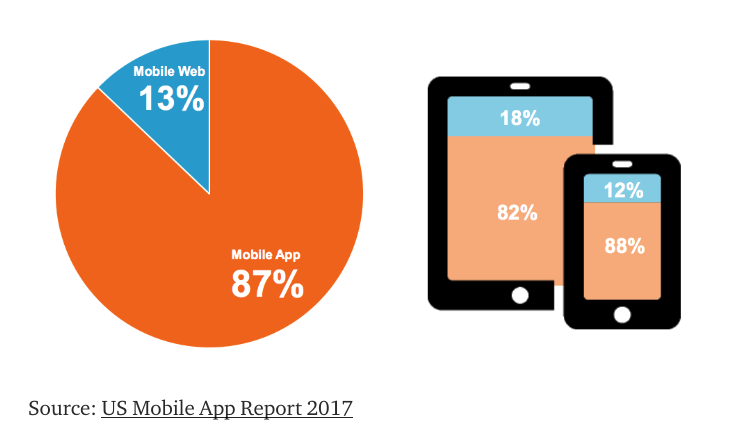Mobile app benefits | 7 minutes read
When thinking about a mobile app for your organization it is quite common to ask yourself why do you need a mobile app when you already have a website?

Firstly, with the increasing time using mobile phones, companies have started to optimize their websites and digital content for mobile phones. So definitely, a mobile (or mobile friendly) website became a digital standard and a must-have for any organization.
Nevertheless, having a mobile website is not enough to cover all the digital needs of your audience and stay connected with the community.
For example, according to comScore Mobile App Report, 87% of mobile phone users spend their digital time on a mobile app rather than on the mobile web. People prefer to communicate, find news, entertain in mobile applications than on mobile websites.

This is obvious, people like to get the information with one click on the icon on the mobile phone instead of keeping in memory the name of the website, go to the browser, type and wait for launching. But, it is not the only advantage. There are a lot of other factors which influence the user experience, the level of engagement, and the general perception of your organization.
Here are the most important of them.
1) Mobile apps are faster than the web
The reason for this is that mobile apps are installed directly on the phone and they can store all the data on it so it launches directly from the phone. A mobile website is just an optimized version of your website which behaves the same as a desktop website: the web app speed depends on many factors like content optimization, internet speed connection, etc. Besides this, you cannot access the website without an internet connection while the mobile app can be launched when you are off-line.
2) A mobile app can use the resources of the mobile phone system
With the mobile app, people can use phone identification with fingerprint, use a camera to catch the moment of the event, access the user’s contacts, use GPS (or beacons) to connect with maps and other services on the phone. A web app cannot use such features as effectively or at all in some cases.
Imagine how a mobile app can benefit you when organizing a vote or survey – people can authorize with their fingerprints with no additional requirements. During the event, people can catch the moments to share immediately in the app.
3) Mobile app notifications are more convenient to use
This is one of the most important features for organizations and the powerful tool in building engagement with community members. Mobile app notifications deliver messages which pop-ups on the screen and may consist of the text, images, sound, and video. It’s easy to create and deliver such messages to all who have installed a mobile app.
As for the websites, there is a technical opportunity to send pop-up notifications as well, but it requires additional installations to implement a web push service on the website. Besides this, there are some restrictions on browsers and mobile devices who support web push notifications which at the moment make web push notifications less effective.

4) Users have a better experience and are more loyal to the brand with a mobile app
User experience is highly important in building long term relations and nourish loyalty. Users love customized content which web applications, unfortunately, cannot deliver. In a mobile app, users can adjust content performance in settings and customize it according to their preferences, like language, geolocation, news they want to receive, interface, etc. Moreover, mobile apps support mobile gestures like a drag, tap, double tap and more, that increases user-experience as well.
A mobile app is customized according to a company’s brand standards and for example, like native apps that guarantee the same performance on Android or iOS device. In contrast, with the web app, it is quite difficult to ensure the same performance for each browser on every device.
5) A mobile app can reduce expenses
When you have a mobile app it is very easy to distribute promotions through an app without any additional costs. You already have your loyal audience which more likely participates in your initiatives whether you invite them to buy some branded products or participate in donation activities. Moreover, when organizing voting or survey you don’t need to use paper-based documents because the entire process can be automated directly in the app: authentication, forms, submissions, and collecting results.
To summarize, there are visible benefits of mobile apps that each of us can define according to personal and our organization’s needs. Nevertheless, mobile apps will not completely replace web sites, at least for the short term perspective. On the contrary, they support the company’s presence in the digital medium both standard and mobile. So we would say, it is becoming the new standard for any organization to have both a responsive web site and a mobile app.

Share This Article